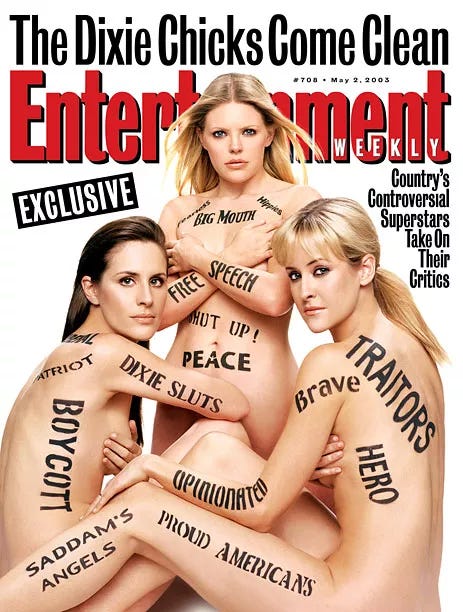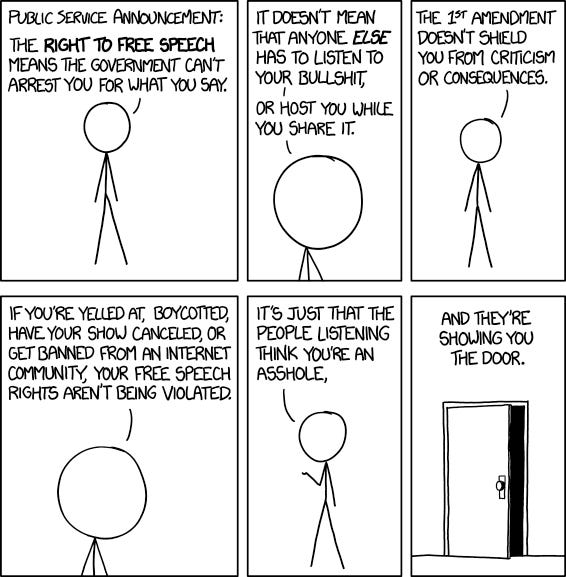Back in 2003, The Dixie Chicks were performing in London right before the start of the Iraq War and singer Natalie Maines criticised the President.
Just so you know, we're on the good side with y'all. We do not want this war, this violence, and we're ashamed that the President of the United States is from Texas.
The backlash was immediate and intense. There was a campaign to have them banned from radio stations across Texas and the second-largest radio broadcaster responded, removing them from circulation. The Dixie Chicks were effectively shut down.
It’s one thing to decide you are not going to support an artist or a writer because you don’t agree with their political opinions. It’s quite another to say that no one else can hear them or read them either.
As an expat Englishman living in the States, I always admired the First Amendment’s robust defence of speech against government interference. It’s the only bit of the American Constitution that really jumps out at me as special. It was radical in 1791 and it’s still almost unique in 2023.
Coming home to the UK, I have been shocked at the cavalier way that speech is policed in my own country, with tweeters arrested for racist comments and a Christian sent to prison for carrying a sign saying: “Stop homosexuality. Stop lesbianism”. Harry Miller was added to a register for hate incidents for satirical tweets protesting the Gender Recognition Act. Miller successfully challenged the response and the High Court agreed that the police’s response was unlawful and interfered with Mr Miller's right to freedom of expression (BBC, 2021). But how did we get to the point where the police decided they should pay a visit to people who say things they disagree with?
"I was assigned mammal at birth, but my orientation is fish. Don't mis-species me."
— Harry Miller
Of course, the First Amendment is only a constraint on the American government and private companies are free to ban or publish whatever they choose. Many people take this to mean that free speech is only about government restrictions but I believe this attitude is mistaken.
Yes, the First Amendment only applies to the US Government but the arguments in favour of free speech apply to whoever is doing the restricting. In general, people who think freedom of speech is a good idea should defend speech against censors of all stripes when others reach for the ban hammer against speech they don’t like. Of course, you don’t have a right to say whatever you like whenever you like but we should be suspicious of any organisation that wants to control who can say what — especially if they own all the radio stations in Texas or if they publish newsletters on the Internet.
Should we ban Nazis?
Over the last couple of weeks, there has been a rowdy debate about whether Substack should ban Nazis. It began when The Atlantic published an article by Jonathan M. Katz claiming that Substack Has a Nazi Problem. Katz found that a prominent neo-Nazi has a successful Substack newsletter and there are half a dozen more that are less popular. Katz thinks it outrageous that Substack would give a platform to Nazis and demanded that the leadership of Substack explain themselves.
The campaign letter says they are not asking Substack to ban the Nazi accounts; they merely want Substack to explain their position. This claim is disingenuous as further into the newsletter it quotes another journalist, Casey Newton, saying:
“The correct number of newsletters using Nazi symbols that you host and profit from on your platform is zero.”
Certainly, the people who have been outspoken about the subject have advocated quite strongly for a ban.
There’s a slippery slope inherent in any argument about free speech. On the one hand, it’s possible that allowing Nazis to post on Substack will result in an Evil Cloud of Nazi Posts and before you know it, Substack will be all Nazis all the time. On the other hand, if we ban Nazis we must inevitably ask who we are going to ban next.
When I started this post, I intended to argue that the Nazi Substacks were in some obscure corner where you’d never see them unless you went searching but, in the last couple of days, I have had two newsletters show up in my Notes feed that were quite abhorrent. They didn’t identify as Nazis but they were extreme nationalists who advocated violent racist policies that I found quite shocking. Should we ban them? I don’t know. It wouldn’t break my heart if Substack were to ban newsletters like that but it inevitably makes me wonder who they should ban next.
I’ve encountered quite a few authors on Substack who make claims about immigration or race realism or populism (for example) that I disagree with. Ban them too? I think they are often wrong and I tell them so. But we engage in arguments that wouldn’t even be possible elsewhere and I often learn something. Hopefully, they do too. I’m a liberal lefty but I appreciate hearing points of view that I disagree with. I appreciate the opportunity to argue against them.
Who to ban next?
So let’s agree that Nazi newsletters are appalling and we should ban them. Who should we ban next? I have some suggestions.
The Khmer Rouge’s version of Marxism was quite appalling. We should certainly ban that. The Cultural Revolution in China was quite unpleasant too. Come to think of it, lots of Marxist governments did bad things. Maybe we should ban all discussion of Marxism to be safe. On the other side of the ledger, all kinds of fascists want to do bad things. We should certainly ban them. Maybe ban supporters of right-wing governments too.
What about antisemites who support terrorist attacks against Israelis? What about Zionists who support the bombing of Gaza? Homophobes? People who deadname transgender folk? People who promote Genderqueer books? Country singers who criticise American foreign policy? We are just getting started.
A successful call to ban one kind of speech will likely lead to another call to ban the next kind of speech. If we draw a line in the sand, someone will inevitably try to test the line and we’ll have to think about where to move the line. Banning the incitement of violence seems like the right thing to do but banning politics we disagree with feels problematic.
Allowing nudity on Only Fans resulted in it being overrun by porn. I don’t expect that Nazis will overrun Substack in the same way but if it looks like they will, the management of Substack should step in. I think Substack has made the right call for now but I fully expect that they’ll have to make a different call in the future.
“If all mankind minus one, were of one opinion, and only one person were of the contrary opinion, mankind would be no more justified in silencing that one person, than he, if he had the power, would be justified in silencing mankind.”
John Stuart Mill








I’m very unhappy about cancel culture taking hold in the U.K. In particular one of the frequent news articles is about some university or other banning a speaker. I understand that young people are vulnerable and suggestible but this simply says to me that our education system is failing our children. Why are we teaching them about Henry VIII but not how to manage one’s finances, plaster a wall, fix a leak, cope with social media, and be able to think for themselves and recognise that there are two sides to everything they hear and read? Argh. Sign me up for freedom of speech as long as it is not inciting violence. Else, as you say, where do you draw the line? John Stuart Mill was bang on.
Great post. Interesting to see that Substack has decided to remove some ‘Nazi accounts’ today. Not a fan of Nazis. Also not a fan of other people telling me what I, a grown up, is allowed to read on Substack. Slippery slope indeed. I like to think that it goes no further. But since that has never ever been the case on any other platform, I’m not too hopeful.